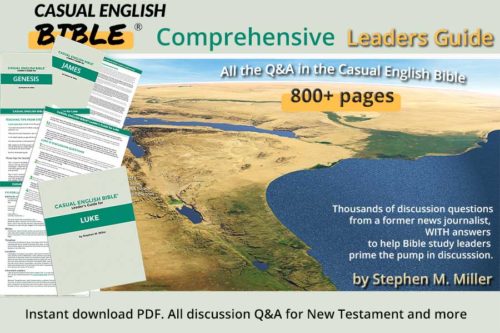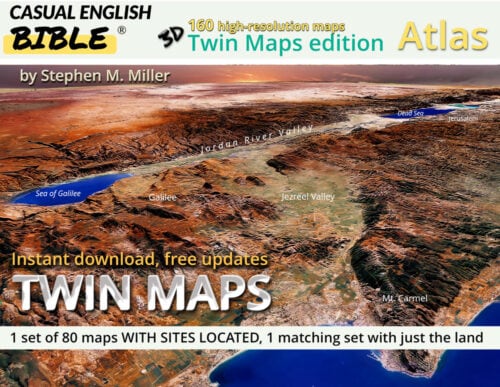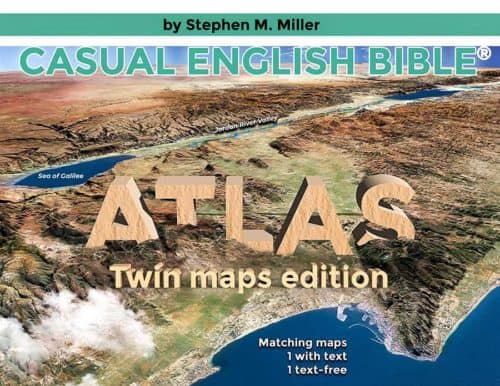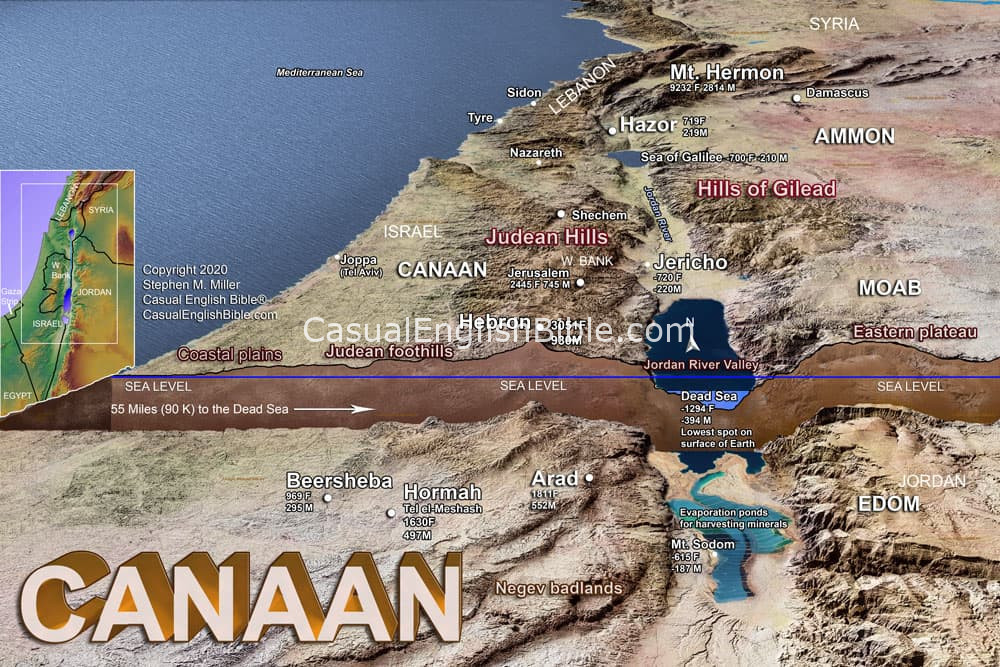Judges 11
Jephthah sacrifices his daughter
Jephthah disowned
1Jephthah was the son of a man named Gilead [1] and a prostitute. He grew up to become a warrior. And he was good at it. 2Gilead’s wife gave birth to a couple sons. When they grew up, they disowned their half-brother Jephthah and kicked him off the land. They told him, “You’re not going to inherit any of Dad’s estate. You’re the son of someone else’s mother.” [2] 3Jephthah left home and lived in the territory of Tob. [3] He built a militia of men good for nothing but robbing and fighting. They joined him on raids.Ammon attacks Israel
4People of Ammon later attacked Israelites living in the area. 5Israelite leaders went to Tob and asked Jephthah to come back with them. 6They told him, “We want you to command the army that will fight the Ammonites."7Jephthah said, “You do, do you? Don’t you remember that you’re the people who kicked me out of my father’s house. And now you have the nerve to ask for my help when you’re in trouble?” 8The leaders of Gilead said, “Yes, we know. But we're coming to you anyhow, asking you to lead us in the battle. If you do, we’ll appoint you ruler of Gilead.” [4]
9Jephthah said, “Are you feeding me a line? If I come back with you, and the LORD lets me defeat the Ammonites, will you really do what you said—you’ll make me ruler?” 10The leaders of Gilead told Jephthah, “Yes. And we’ll make that promise with the LORD watching. Once you become our ruler, we’ll do whatever you say.” 11So Jephthah went back with the leaders, and they appointed him ruler of Gilead and commander of the army. He took the oath of leadership at a sacred site at Mizpah, with the LORD watching.
Words before the war
12Jephthah sent a message to the king of Ammon, asking, “What’s the problem here? Why are you coming onto my land to fight me?”13Ammon’s king sent a reply. “When Israel’s people came here from Egypt, they stole my land from the Arnon River to the Jabbok River to the Jordan River. Give it back to me peacefully.”
14Jephthah answered the king. 15“This message is from Jephthah: Israel didn’t take land from the people of Moab or Ammon. 16When Israel came up here from Egypt, they traveled through barren wasteland and the Reed Sea, [5] on their way to the Kadesh oasis. 17Israel sent messengers to Edom’s king, asking, ‘Would you allow us to pass through your land?’ The king would not. Israel asked the same of Moab’s king, with the same result. So, Israel stayed at Kadesh for a while. 18When they started traveling again, they circled around Edom and Moab. To take that bypass, they had to walk through desolate land again. They camped on the far side of the Arnon River, to the east. They didn’t step on Moab’s land because Arnon marked the eastern boundary. 19Israel sent messengers to Sihon, king of the Amorites, who ruled in his capital at Heshbon: ‘We would like permission to pass through your country.’ 20Sihon didn’t trust Israel enough to let them do that. So, he assembled his army and camped at Jahaz. That’s where he fought Israel. 21He lost. Because of it, the LORD gave Sihon and his people to Israel. So, Israel took the land and lived there.
22They controlled all the land you’re talking about, from the Arnon to the Jabbok and from the desert in the east to the Jordan River in the west. 23Israel’s God, the LORD, crushed the Amorites. Are you planning to step into this picture and pick up where they left off? 24Shouldn’t you be satisfied with what your god, Chemosh, [6] gives you? And shouldn’t we be allowed to take everything the LORD, our God, gives us? 25Are you any better than Moab’s former king, Balak [7] the son of Zippor? Did he argue with Israel about the land? Did he go to war with them? 26Let’s be clear, you want land that Israel has lived on for 300 years. This includes the cities of Heshbon and Aroer along with their outlying communities along the Arnon River. If this land belonged to you, why didn’t you take it earlier? 27I haven’t done anything wrong to you. You’re the one causing trouble. You’re starting a war against me. The LORD will have the final say about all of this.” 28Jephthah’s message didn’t change the Ammonite king’s mind.
Jephthah’s tragic vow
29The LORD’s Spirit came into Jephthah, [8] who left to fight the enemy. He left his home in the city of Mizpah in Gilead. He traveled through the territory of Gilead and the tribal land of Manasseh, on his way to engage the Ammonites. 30Before the battle, Jephthah made a promise to the LORD: “If you let me defeat the Ammonites, 31I will sacrifice [9] the first thing that comes out of my house to meet me when I get home.” [10]32Jephthah met the Ammonites in battle, and the LORD let the Israelites win the war. 33Israel routed the Ammonites, decimating 20 towns from Aroer [11]to Minnith and as far as Abel-keramim. Israel won the war and Ammon lost.
Daddy’s dancing daughter
34When Jephthah got home to Mizpah, his daughter—dancing and playing a tambourine—came out to welcome him. She was an only child. Jephthah didn’t have any other children.35When he saw her, he ripped his clothes in grief and said, “Oh no! My daughter, you’re breaking my heart. I feel terrible. I made a promise to the LORD, and I can’t take it back.” [12]
36His daughter said, “Daddy, if you promised the LORD, you need to do what you promised. The LORD let you beat the Ammonites. Do to me whatever you promised the LORD. 37But let me ask one favor first. Let me go on two months of retreat in the hills. I want to be with my friends. We can be sad together that I have to die as a young virgin.”
38“Go,” he said. And he sent her away for two months. She and her friends left for the hill country. They all mourned for her, and for the fact that she would die a virgin.
39Two months later she came back home, and her father did what he promised. [13] She died without ever having sexual relations with a man. So, the women of Israel memorialized her in what became a custom. 40Four days every year the women would remember the daughter of Jephthah from Gilead and grieve over what happened to her.
Footnotes
“Gilead” was a common name for people or places. It seems to have referred to a stone monument. People built stone monuments to remember something important that happened there.
In this context, Jephthah may have heard these words as, “You’re the son of a bitch.” So, he left.
Tob was apparently a kind of hole in the wall Badlands town and a safe haven for robbers, killers, and people banished from their homes and towns.
This was their second offer. The first offer, as commander of the army, wasn’t enough.
Many Bibles say “Red Sea.” But the Hebrew words are yam suph, “sea reeds.” Later in the story, Moses and the Hebrew refugees will escape through a path God makes in this body of water. Scholars usually track Moses and the Hebrews escaping Egypt by walking southeast, out of the Nile Delta fields and toward the Red Sea and the Sinai Peninsula. They would have passed through lake regions along what is now the Suez Canal, which connects the Red Sea to the Mediterranean Sea. These lakes and ponds reportedly had reeds growing along the banks, like the ones the Bible says grew along the Nile River and helped anchor Baby Moses in a basket (Exodus 2:3).
Chemosh was Moab’s national god, and possibly the Ammonites as well. King Solomon later married into the religion and even built a sanctuary to Chemosh on the Mount of Olives. That legitimized this idolatry for about 400 years. Israel’s idolatry, the prophets said, would be why God would allow invaders to wipe the Jewish nation off the political map of the world. Babylonians from what is now Iraq did that in 586 BC. The god’s name shows up in a Canaanite inscription chiseled into a stone record known as the Mesha Stele or the Moabites Stone, from the 800’s BC. It’s on display in the Louvre Museum in Paris.
King Balak hired a sorcerer named Balaam to put a curse on Moses and the Israelites. Instead, Balaam blessed them on three occasions (Numbers 22:2-24:25). After that, King Balak went back home.
Earlier, the LORD’s Spirit came to Othniel (3:10) and Gideon (6:34). Like them, Jephthah received a unique Spirit of leadership and power, with perhaps the kind of charisma some people have today, which attracts fans and followers. The Christian movement started producing congregations after God’s Spirit came to Jesus’ followers in Jerusalem (Acts 2). Full of spirit, boldness, and courage, Peter preached a sermon in the city that five weeks earlier had executed his rabbi, Jesus Christ. The sermon produced more than 3,000 converts, forming the First Church of Jesus the Messiah. Not an official name. Just descriptive.
This sacrifice is a “burnt offering.” The entire creature is burned to ashes. How-to instructions are in Leviticus 1.
Did Jephthah think the family goat would be the first to welcome him home from a victorious war? Was he hoping it would be his wife? Was he a good warrior, but with a head for rational thought that only a woodpecker could appreciate? What was he thinking? Clearly, he had been anxious about the coming battle because he was trying to make a deal with the LORD, as if Jephthah had anything the LORD needed.
Location of the three cities mentioned here is uncertain. Educated guesses link Aroer with the city of Arnon or somewhere southwest of Amman. Abel-keramim has been linked to Naur, a few miles southwest of Amman, and to Abila, which Roman historian Eusebius said was six Roman leagues from Amman. A league was the distance a person could walk in an hour, roughly a mile and a half (2.4 km). Six leagues was about nine miles (14 km).
Jephthah certainly felt sorry for himself. But we’re left to wonder if he thought about how his daughter felt. He said he couldn’t take back the promise. Normally, that’s right. But the laws of Moses allow for promises that involve other people to be annulled (Numbers 30). A husband, for example, can cancel a promise his wife makes if he doesn’t approve of it (Numbers 30:13). It’s not an impossible stretch, even in this patriarchal age of men as Boss, to allow the daughter or her mother or her Uncle Willard of Gilead to object and cancel the vow. Especially since human sacrifice was not one of the accepted offerings in Israel. Abraham’s near-sacrifice of his son Isaac was a test of faith. No one got chopped into pieces and burned to ashes. Not until Jephthah came home. (Uncle Willard of Gilead, by the way, is fictional.)
If Jephthah followed instructions for a burnt offering in Leviticus 1, he killed his daughter quickly, drained her blood, cut her into pieces and burned her to ashes “as an offering—a sweet smell to God” (Leviticus 1:9). But those instructions were for slaughtering and sacrificing animals, not children.
Discussion Questions
- Sorry, there are currently no questions for this chapter.













